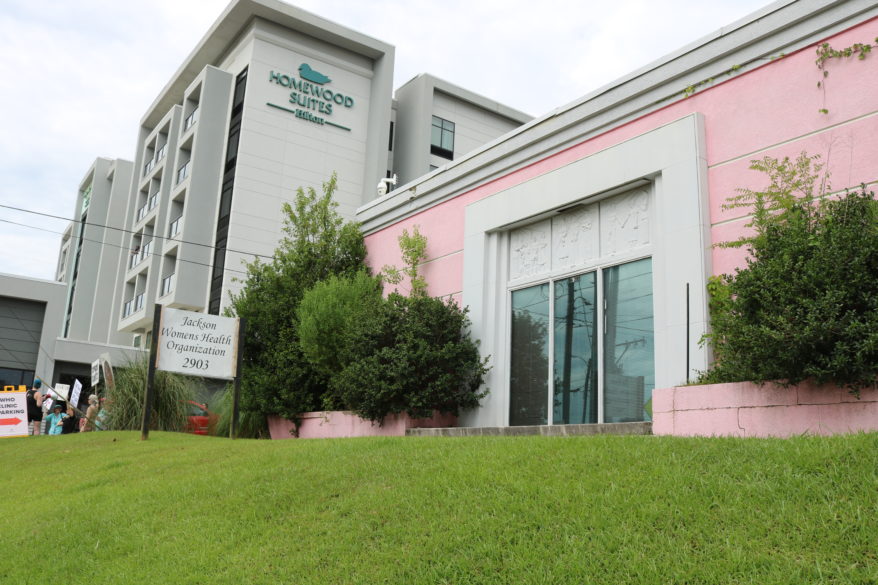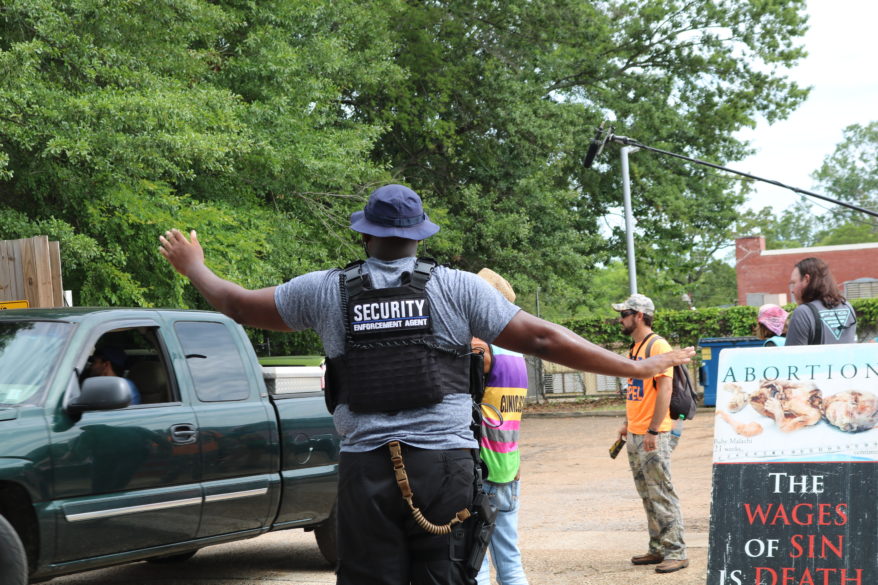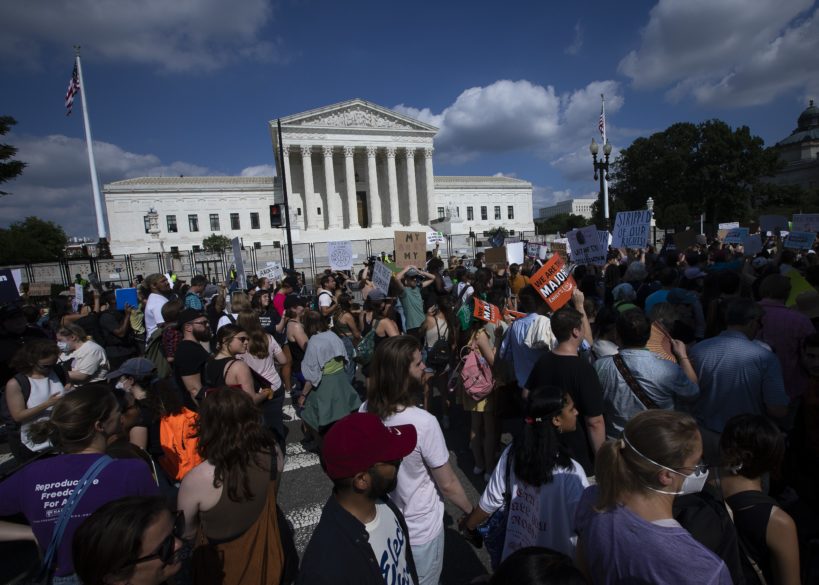By Joanna Puddister King
JACKSON – On the evening of July 6, the Jackson Women’s Health Organization closed its doors for the final time, making it the first time in 49 years that the state of Mississippi has no operating abortion clinic. This coming after the U.S. Supreme Court overturned its nearly five decades old decision in Roe v. Wade that legalized abortion.
The Court’s opinion in Dobbs v. Jackson Women’s Health Organization handed down on Friday, June 24 held that the Constitution does not confer a right to abortion, with the authority to regulate abortion returned to the states.

The Dobbs case centered around Mississippi legislation that was passed in 2018 called the Gestational Age Act, that sought to prohibit abortions after 15 weeks gestation. The Jackson abortion clinic and one of its doctors sued Mississippi officials in federal court, saying that the law was unconstitutional.
The federal district court and the Fifth Circuit Court of Appeals, both ruled in favor of the clinic, blocking enactment of the law.
In May 2021, the U.S. Supreme Court decided it would take up Dobbs, marking the first time since Roe that it would take up a pre-viability ban.
More than 140 amici curiae briefs were filed with the Supreme Court on the Dobbs case, the very first being from the Dioceses of Jackson and Biloxi, stating that “the church has a vested interest in this matter – the dignity and sanctity of all human life.”
While originally asking the Court to hear arguments on a viability question – whether all pre-viability prohibitions on elective abortions are unconstitutional – Mississippi changed course and argued before the Supreme Court on Dec. 1, 2021 that Roe should be completely overturned and the authority to regulate abortions be returned to the states.
With Associate Justice Samuel Alito writing for a 5-4 majority he states that “we hold that Roe and Casey must be overruled. … The Constitution makes no reference to abortion, and no such right is implicitly protected by any constitutional provision.”
Alito’s opinion closely mirrored a leaked initial draft majority opinion, shared on May 2 by Politico.
Alito was joined by Justices Clarence Thomas, Neil Gorsuch, Brett Kavanaugh and Amy Coney Barrett. Chief Justice John Roberts concurred with the majority but in a separate opinion wrote that he would have taken “a more measured course” by “rejecting the misguided viability line” by Roe and Casey, but not overturning Roe completely.
The Supreme Court has six Catholics on the bench – Justices Alito, Kavanaugh, Thomas, Coney Barrett, Roberts and Sonja Sotomayor, with the latter joining Justices Stephen Breyer and Elena Kagan in dissent of the majority.
“One result of today’s decision is certain,” wrote the dissenting justices,” the curtailment of women’s rights, and of their status as free and equal citizens.”
Of major concern of the dissenting justices was the discarding of the viability balance afforded by Roe and Casey.
“Today, the Court discards that balance. It says that from the very moment of fertilization, a woman has no rights to speak of,” the justices wrote, mentioning that some state’s already passed “trigger” laws contingent on the U.S. Supreme Court overturning Roe v. Wade.
Mississippi’s trigger law passed in 2007, only allowing abortion if the pregnant woman’s life is in danger or if the pregnancy is caused by a rape reported to law enforcement. Twelve other states also have trigger laws.
On Monday, June 27, after Mississippi Attorney General Lynn Fitch certified that Roe had been overturned, the clock began to tick on the trigger law which was set to take effect 10 days post determination on July 7.
After the Dobbs decision was released, many statements were released in celebration and some in outrage.

Bishops Joseph R. Kopacz and Louis F. Kihnemann released a joint statement commending the decision and recognizing much needs to be done to assist mothers and families.
“The church will continue to accompany women and couples who are facing difficult or unexpected pregnancies and during the early years of parenthood, through initiatives such as Walking with Moms in Need,” stated the bishops in their June 24 statement.
“Our respective dioceses will continue to collaborate with organizations such as Her Plan, Pro-Life Mississippi and many others to bring vital services to support mothers and the unborn.”
Catholic leader, Mississippi Lieutenant Governor Delbert Hosemann stated that Mississippi is a leader on protecting the unborn with a law in place that prohibits abortion.
“I am pro-life,” stated Hosemann. “I am also pro-child. In addition to protecting the unborn, we must also focus on other ways to support women, children and families.”
Mississippi Attorney General Lynn Fitch, who led efforts to overturn Roe, also released a statement after the decision stating, “Now, our work to empower women and promote life truly begins. The Court has let loose its hold on abortion policy making and given it back to the people.”
The USCCB also released a statement by Archbishop Jose H. Gomez of Los Angeles, president of the U.S. Conference of Catholic Bishops and Archbishop William Lori of Baltimore, chairman of the USCCB’s Committee on Pro-Life Activities.
“Today’s decision is also the fruit of prayers, sacrifices, and advocacy of countless ordinary Americans from every walk of life. Over these long years, millions of our fellow citizens have worked together peacefully to educate and persuade their neighbors about the injustice of abortion, to offer care and counseling to women, and to work for alternatives to abortion.”
The environment outside of the Jackson Women’s Health Organization – also known as the “Pink House” due to the bright pink hue it was painted in January 2013 – was anything but peaceful in the aftermath of the Dobbs decision. Until the clinic closed for good on the evening of July 6, pro-life and pro-choice voices clashed amid national and local news reporters from near and far.
As an effort to keep providing services, the Jackson Women’s Health Organization requested a temporary restraining order to block the trigger law from taking effect but it was denied by chancery judge, Debbra K. Halford on Tuesday, July 5, reasoning that the state Supreme Court would reverse the 1998 Pro-Choice Mississippi v. Fordice ruling that relied on the Mississippi Constitution for a right to privacy.

The abortion clinic filed a petition to the Mississippi Supreme Court allow it to reopen, citing Fordice where the court stated it did not “interpret our Constitution as recognizing an explicit right to an abortion, we believe that autonomous bodily integrity is protected under the right to privacy as stated in In re Brown.” On July 11, the court rejected the clinic’s plea to stop the abortion ban. The court will wait for arguments from Attorney General Fitch to be submitted before ruling on the petition.
Nationally, President Joe Biden signed an executive order on Friday, July 8, aiming to protect access to abortion in the wake of the Supreme Court overturning Roe. The order attempts to protect access to medication abortion, access to contraception and to guarantee a patient’s right to emergency medical services.
Speaking from the White House on July 8, President Biden urged women to “head to the ballot box” to “reclaim the right taken from them by the court.” He stated that “the fastest way to restore Roe is to pass a national law, codifying Roe.”
In response, the USCCB released a statement from Archbishop Lori stating, “I implore the president to abandon this path that leads to death and destruction and to choose life. As always, the Catholic Church stands ready to work with this Administration and all elected officials to protect the right to life of every human being and to ensure that pregnant and parenting mothers are fully supported in the care of their children before and after birth.”
Bishops Kopacz and Kihnemann remain “grateful for the Supreme Court’s decision but are also mindful that the battle to uphold the sanctity of life is an ongoing effort.”
“Let us pray and continue to raise our voices both in our churches and in our communities in defense of human dignity and justice.”
Statement from Bishop Joseph R. Kopacz and Bishop Louis F. Kihneman on Supreme Court’s Ruling in Dobbs. v. Jackson Women’s Health Organization
Today, Lady Justice has turned her attention to the cry of the unborn child hidden in the refuge of his or her mother’s womb. Today, justice has not abandoned that unborn child and his or her capacity to feel pain, but there is still more work to be done.
Together with many throughout our country, we join in prayer that states are now able to protect women and children from the injustice of abortion. The Catholic Church has had a vested interest in this matter – the dignity and sanctity of all human life.
The church has a long history of service to those who are most vulnerable and remains the largest private provider of social services in the United States. Through its charity agencies, and the independent efforts of its members, the Catholic Church is supporting all women in addition to the child in the womb.
The church will continue to accompany women and couples who are facing difficult or unexpected pregnancies and during the early years of parenthood, through initiatives such as Walking with Moms in Need.
With our brother bishops, we renew our commitment to preserving the dignity and sanctity of all human life by:
• Ensuring our Catholic parishes are places of welcome for women facing challenging pregnancies or who find it difficult to care for their children after birth, so that any mother needing assistance will receive life-affirming support and be connected to appropriate programs and resources where she can get help.
• Helping fellow Catholics recognize the needs of pregnant and parenting moms in their communities, enabling parishioners to know these mothers, to listen to them and to help them obtain the necessities of life for their families.
• Being witnesses of love and life by expanding and improving the extensive network of comprehensive care including pregnancy help centers, and Catholic health care and social service agencies.
• Increasing our advocacy for laws that ensure the right to life for the unborn and that no mother or family lacks the basic resources needed to care for their children, regardless of race, age, immigration status or any other factor.
• Continuing to support and advocate for public policies and programs directed toward building up the common good and fostering integral human development, with a special concern for the needs of low-income families and immigrants.
In all of these ways and more, the Catholic Church witnesses to the sanctity of human life, from conception to natural death, and continues to work to build a culture of life in our nation.
Our respective dioceses continue to collaborate with organizations such as Her Plan, Pro-Life Mississippi and many others to bring vital services to support mothers and the unborn.
The community can immediately accompany women and couples who are facing difficult or unexpected pregnancies through the Walking with Moms in Need initiative in the Diocese of Jackson. For more information on how to get involved or offer support to women in need, please contact the Office of Family Ministry coordinator in the Diocese of Jackson at charlene.bearden@jacksondiocese.org. In the Diocese of Biloxi, contact Deacon Jim Gunkel, director of the Office of Family Ministry and Family Life at jgunkel@biloxidiocese.org or Margaret Miller, coordinator of Walking with Moms at mrmiller@biloxidiocese.org.
Additionally, there are Catholic Charities Community Outreach Centers located in the Diocese of Biloxi in Gulfport, Hattiesburg, Waveland and Pascagoula. These centers provide confidential pregnancy testing; Medicaid pregnancy confirmations; life-affirming options counseling; case management (including budgeting and goal setting); basic needs assistance; car seats and safe sleeping spaces for infants; diapers formula, clothing, blankets, socks, etc.; and representative payee services. The Diocese of Biloxi is also sharing the pro-life message through its Pro-Life Billboard initiative.
The Diocese of Biloxi will also be resuming adoptions and foster parenting services in the near future, complementing existing programs in the Diocese of Jackson that have provided those services through Catholic Charities, Inc. for over a half century.
Again, we are grateful for the Supreme Court’s decision but are also mindful that the battle to uphold the sanctity of life is an ongoing effort. Let us pray and continue to raise our voices both in our churches and in our communities in defense of human dignity and justice.
